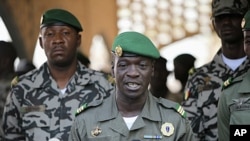Tuareg rebels in northern Mali who seized three towns in a fast-moving offensive have declared an end to military operations.
The separatist National Movement for the Liberation of Azawad (MNLA), which wants northern Mali to become a separate state that will serve as its homeland, declared a cease-fire Thursday, saying it had accomplished its goal.
The Tuareg rebels, along with Islamist fighters, seized the cities of Kidal, Gao and Timbuktu over a three-day period beginning last Friday.
It is unclear if the Islamist militants, which fought alongside rebels, will also put down their weapons. The Islamist group, which has been linked to the al-Qaida branch in northern Africa (AQIM), has imposed Islamic law in some areas.
Islamists also sacked the Algerian consulate in Gao on Thursday and are reportedly holding Algerian officials. Algeria, which borders Mali, has long been a critical player in the fight against terrorism in the Sahel region.
On Thursday, French Foreign Minister Alain Juppe warned that the Tuareg rebel issue can be solved only through dialogue and not through military action.
Northerners Malians based in Bamako have called for humanitarian corridors to funnel urgently needed assistance to people in the aftermath of mass looting across a region already hard hit by drought and food shortages.
Junta leaders pressured
Meanwhile, pressure continued to mount against renegade Malian soldiers who seized power from President Amadou Toumani Toure on March 22. Mali's main political parties have rejected calls by junta leaders for a "national convention" to sort out the country's political and security problems.
But on Wednesday, coup leader Captain Amadou Sanogo announced on junta-controlled television that the group is postponing the convention because it needs more time to organize.
The meeting had also been rejected by the ECOWAS bloc [Economic Community Of West African States] as a junta ploy to buy time, and the FDR coalition of 50 political and civil-society groups had said that such a convention would not be compatible with a return to constitutional order.
"We are waiting for the country’s institutions to get back to functioning normally," said coalition co-founder Tieman Coulibaly. "It’s only from that point that we can envision moving forward. ... The junta might go ahead with [the meeting], but they’ll do it without our political coalition."
Embargo takes toll
Power cuts have been rampant since ECOWAS shut the land-locked country’s borders and blocked money from reaching government accounts on Monday, and people who can afford food supplies and gasoline are stocking up.
On Thursday morning, Bamako markets and public transport were running fairly normally, but people remained worried about what lies ahead if the embargo continues.
At a local convention hall, women dressed in white had convened to march against the junta's national convention. When it was cancelled, they instead held a meeting to discuss how civil society should proceed.
The Tuareg Uprising
- Tuaregs are an ethnically Berber, nomadic people in West Africa's Sahel and Sahara regions.
- Tuareg fighters have staged multiple uprisings in Mali and Niger for greater autonomy.
- Current Mali rebellion began in January after Tuareg fighters returned from Libya, where they fought for Moammar Gadhafi.
- The conflict has driven about 100,000 Malians to neighboring countries, internally displaced more than 90,000.
- Losses to Tuaregs prompted soldiers' coup in Bamako Thursday March 22.
"People want concrete actions," said Alwata Ichaita Sahi, an activist in Malian women’s groups. "The junta, political parties and the international community must find urgent solutions to get Mali out of this impasse."
While civil servants said they have yet to be paid for the month of March, some Malian youth have mixed views about ECOWAS’s embargo.
"If you impose sanctions on Malians, it’s not the enemies that will be punished, but the whole society will be punished," said 22-year-old Aboubacar, explaining that Malians deserve better. "I think the whole society is not responsible for what is happening in the country now. We do not need sanctions for the time being. We need help."
Like many of his fellow natives of the north, Aboubacar, who's from Gao, said combat has only just begun, and that the international community has an interest in putting down Tuareg efforts to secede.
"We and the United States of America, we have a common enemy," he said. "We want them to give us weapons so we could face this situation. If they can give us weapons, we are ready to go there and fight for our land."
But Assoumane Maiga, 23, said a little bit of harsh measures from ECOWAS may be just what Mali and the region need.
"This is a kind of warning to all of the militaries in the sub-region to understand that now you cannot come and take power like that," said Maiga. "So if there is a problem with the head of state, it’s the people who have to bring the solution, not the military. So I see the sanctions, the embargo, like something which is helping Mali, not something against Mali."
According to Mohamed from Timbuktu, the time for violence has passed.
"The time to fight those guys was when they were in Kidal, not now," he said. "Now they are mixed with the population, with civilians. If we go there to try to fight them we will kill our own families -- that’s not the solution."
The heavily armed Tuareg rebels arrived in northern Mali after the fall of Moammar Gadhafi in Libya, and launched an insurgency in mid-January. Tuareg separatists have been seeking autonomy for decades.













